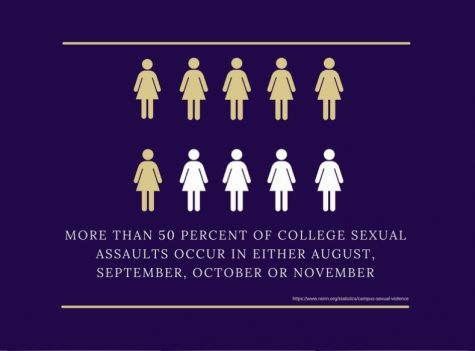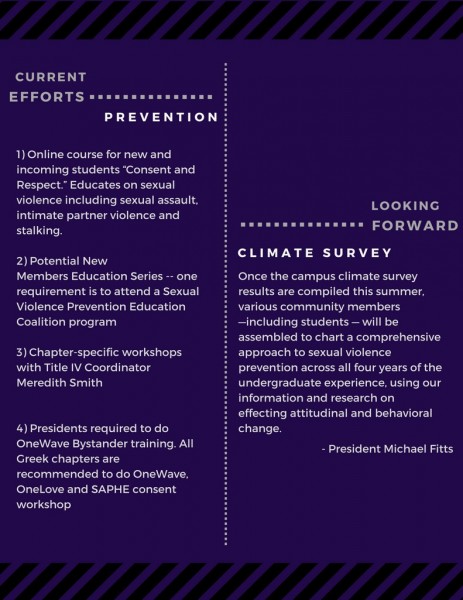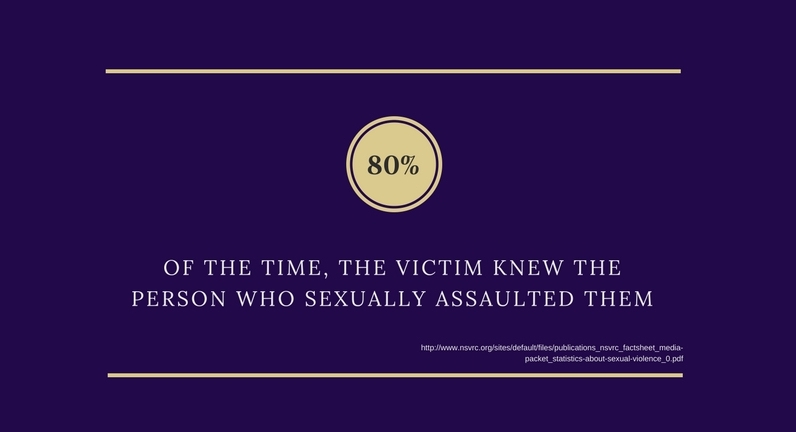Your donation will support the student journalists of Tulane University. Your contribution will allow us to purchase equipment and cover our annual website hosting costs.
Students find sexual assault prevention programs incomplete, lacking
April 27, 2017
Julie*, a sophomore from Dallas, enjoys her various campus involvements, psychology courses and, like most Tulane students, her social life.
One Saturday night, Julie’s social life took the form of a fraternity date party. Julie does not remember when he first kissed her. She does not remember when he began to touch her, and she does not remember saying “yes.” She remembers being surrounded by friends and then suddenly being alone, afraid and assaulted.
More than 40 percent of Tulane students are in Greek life. One in five women and one in 16 men will share an experience like Julie’s while in college. They feel fear, shock and a loss of control that health professionals describe as common for victims of sexual assault.
Director of the Office of Fraternity and Sorority Programs Elizabeth Schafer said national data shows that many students come to college with little understanding of consent.
“Consultants we have worked with have observed that Tulane students seem to lack that understanding and perhaps even have a lower knowledge base about consent than their peers at other schools,” Schafer said.
Several organizations have engaged in programs to increase knowledge and understanding of consent, including the Panhellenic Council Executive Board, which participated in Healthy Relationship Week.
Panhellenic Council President Kendall Knuth said consent, sexual awareness and prevention of sexual assault is a multi-faceted issue.
“Consent is clearly important and something that must be highlighted in overall conversations about sexual violence prevention,” Knuth said. “… I believe that consent ties in very closely with overall respect; active listening and open communication are essential, especially in the physical aspects of a relationship.”

A national 2007 study conducted by Oklahoma University professor John D. Foubert found that fraternity men are more likely to commit sexual assault than are other college men.
National surveys like this one, however, do not provide information specific to Tulane’s campus. Many are waiting on the Sexual Misconduct Climate Survey data to be compiled in order to find a clear path to establishing the next step in sexual assault prevention on Tulane’s campus.
“Just like you take a class to learn a subject or a skill, we need to learn to overcome rape culture and engage in positive sexual behavior,” Title IX Coordinator Meredith Smith said. “… Our goal is to use the survey data to identify the best times … to provide effective ‘doses’ of programming and education.”
 Attention and funding focused on getting a high completion rate for the survey this year, but the Office of Fraternity and Sorority Programs has several initiatives in place to continue sexual assault and consent awareness, education and training.
Attention and funding focused on getting a high completion rate for the survey this year, but the Office of Fraternity and Sorority Programs has several initiatives in place to continue sexual assault and consent awareness, education and training.
Julie said she believes what Tulane currently has in place does not combat the problem.
“It’s not enough,” Julie said. “The OneWave training is more about bystander training … I went through the training, and I don’t feel like I got anything out of it [that would have helped me].”
According to a campus health representative, OneWave challenges the binary of victim and perpetrator, which places the primary responsibility on the victim to prevent the assault.
“One Wave challenges this binary by emphasizing the power in a third individual — the Bystander — to intervene and deescalate harm,” the representative said.
Julie said she wanted the Office of Fraternity and Sorority Programs to bring outside speakers to Tulane because they might bring a different perspective. Julia Hankins, assistant director of the Office of Fraternity and Sorority Programs, said that when possible, the department prefers to use campus-based experts over outside speakers because “the people here understand the culture of Tulane and our Greek organizations better than people who travel the country speaking.”
Undergraduate Student Government President Sam Levin ran his campaign with an emphasis on sexual assault education and prevention. Levin said he felt that even if Greek programming would not bring outside speakers, he encourages students to seek other routes.
“I think that it never hurts to bring in outside speakers and outside perspectives to comment,” Levin said. “… Let’s say Greek organizations aren’t in favor in bringing in someone. There are always organizations … that would be glad to have different speakers and have the operating budgets to do something.”
President Michael Fitts has vocalized his commitment to combatting sexual violence and increasing the reporting of incidents. He feels that while Tulane’s administration and student body has made efforts to address the problem, there is still work to be done.
“Until there are no sexual assaults, we cannot be satisfied with our efforts,” Fitts said in a statement. “We continue to look to the latest research to find what will be most effective.”
*Julie is a student who requested to remain anonymous during the reporting of this article.


Samantha • Apr 30, 2017 at 11:12 pm
So glad Julie has spoken up. Something needs to be done about the sexual assault that continues to be covered up by leaders on this campus.
rick • May 2, 2017 at 8:30 pm
TOTALLY AGREE- cover ups are a real and practiced horror so common at tulane